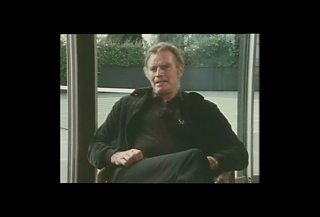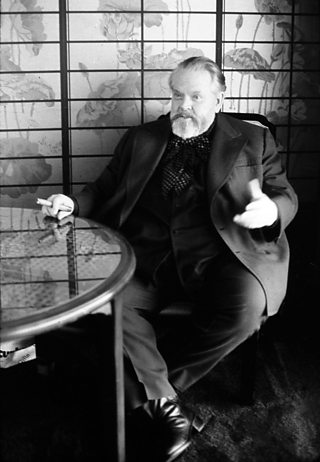Remembering Orson Welles
Orson Welles – actor, director, writer and producer would have been 100 this year. To mark the occasion, a number of events have taken place around the world. The BFI, for instance, held a 2-month celebration throughout the summer, whilst the paid tribute to Welles with screenings and an exhibition named ‘Shakespeare & Cigars’ featuring cigar boxes on which Welles had painted his favourite Shakespearean characters.
Arena met Orson Welles in 1982. The Orson Welles Story, a 3-hour film, is built around an 8-hour interview with the man himself, conducted by director Leslie Megahey. The prospect of facing a cultural giant - who also had a reputation for being a difficult interviewee - was a daunting one for the Arena team.
‘There was complete silence,’ remembers Megahey, of the first time they stood in the same room as Welles. ‘I’d never seen Alan Yentob lost for words.’
All went well however, as Megahey opened with the statement: ‘It does seem that you try to recreate a sort of innocence in your approach to every single film.’
‘I like that very much,’ responded Welles, ‘I think that’s true. And I seldom like anything that is said about my films.’
‘So we’re off to a good start,’ he added, with a chuckle. Relief all round.
This early exchange prefigures the rest of the interview. We see the idea of innocence explored more fully - or what we could think of as a sense of wholeness constantly subject to the threat of compromise and dissolution.
Orson Welles discusses his difficult relationship with movie making
In the story Welles tells about his own film-making career, sabotage is a familiar foe. Interfering producers, money troubles and post-production bust-ups often meant that hustling became more important than any actual film-making. The conditions for making the film he wanted to make, it would seem, were never quite there. Film-making, more than any other art form, is heavily dependent on the artless, the money men, something that Welles clearly grew to resent.

Charlton Heston, interviewed for 'The Orson Welles Story'
‘There is something in him that drives him to alienate the people with the money,’ said Charlton Heston, star of Welles’ 1958 film Touch of Evil, the post-production of which Welles was barred from.
'Perhaps there is a subconscious streak that makes him resent that unlike a painter, who, if he had to, could work in a supermarket, bagging groceries and earning money to buy the paints…as a director, he cannot do that, he must somehow persuade the studio to give him money.’
‘Perhaps on some subconscious level, Orson has never been able to accept this.’
The compromised wholeness that haunts Welles is not simply that of his artistic integrity, but also, that of the truth. Accusations that he actually had no hand on the script for Citizen Kane proved scarring, whilst he is still at pains to correct anecdotes that misrepresent him.
‘It bothers me terribly’ goes his lament, half-joking, half-serious. [They are] my real obsession.’
‘All my loving friends keep telling me to stop brooding about it.’

Orson Welles, photographed during the interview
The elephant in the room, one would think, is that interviews are a prime situation in which Welles has experienced a compromise of the truth, shouldering the weight of a history of misattributions and mangled words. This, however, is no ordinary interview, and Welles senses it. In the marathon conversation that unfolds before us, Welles proves a spectacular interviewee, booming in full, cigar-toting glory, imparting insight, sincerity and self-deprecation. He calls Don Quixote ‘the most perfect knight to have ridden out against a dragon,’ and one cannot help but feel that Welles is here equally chivalrous. The portrait that emerges is a man who, in that most quixotic of ways, is a fool for wanting too much - a fool for wanting to make the perfect film, a fool for daring to dream of self-sufficiency, a fool for rejecting Modernity, much like the Falstaff he plays in Chimes at Midnight. This, however, is a fool one cannot help but admire, a fool who comes out a King, albeit a destitute one.
‘On this earth, the way things are,’ says former co-star Jeanne Moreau, ‘there is no Kingdom that is good enough for Orson Welles.’
Orson Welles’ kingliness is also at the very root of what made him find his own screen presence so problematic.
‘There used to be a division of actors in the Comédie-Française in France – they were called King actors,’ explains Welles.
‘And I’m a King actor…I have to play authoritative roles…or I discombobulate the scene.’
‘It’s a kind of handicap.’
In certain films, Welles would thus retreat into the shadows, as he does in The Magnificent Ambersons, or barely emerge from it, as in The Third Man. With Arena, however, Welles finds a stage fit for a King - and fully embraces the light.
‘Someone in the press,’ notes Megahey, ‘called it the greatest performance of his life – because he was playing himself.’
‘It was the most unforgettable day I ever had working in television.’